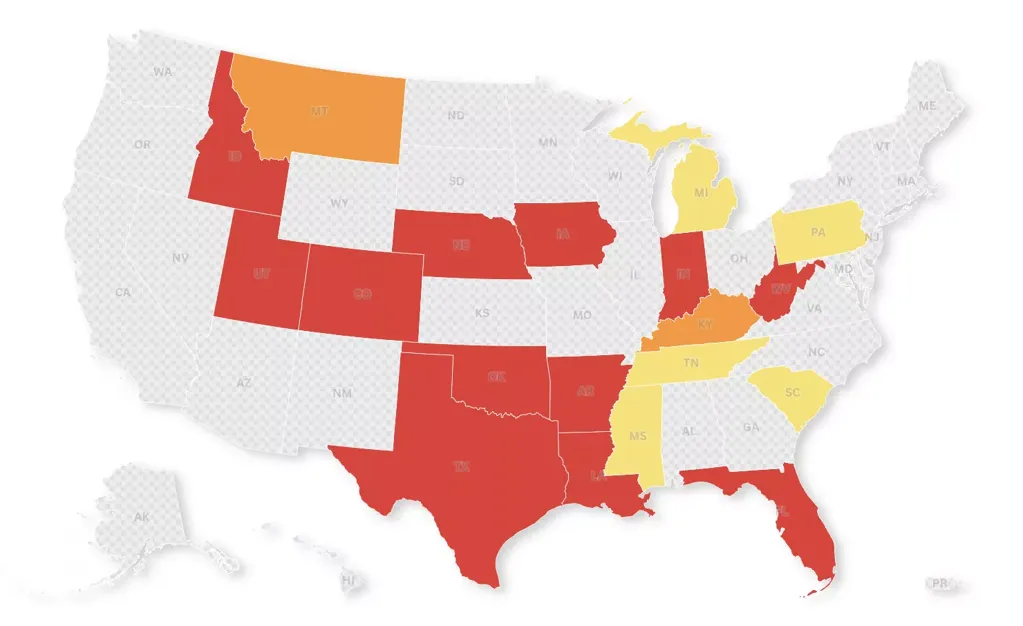Sweeping changes are on the way for millions of SNAP recipients in 12 states that have banned unhealthy food and/or drinks from being purchased using benefits -- and more could soon join them.
The Supplemental Nutrition Assistance Program (SNAP) is paid for by the federal government, but its administration is left to the states, which can change the rules, within reason, on what can be bought using benefits. Such rule changes, known as waivers, are, however, at the behest of the U.S. Department of Agriculture (USDA), which oversees the program.
There has long been a conservative push to limit what SNAP benefits can buy. Under the Trump administration, 12 states, 11 of which are Republican, have successfully changed the rules. Some only ban sugary soda drinks and juices, whereas others have also blocked candy and other confections.
Across all 50 states and eligible territories, users can spend SNAP benefits on most groceries, including fruits, vegetables, meat, poultry, fish, dairy products, breads, cereals, snack foods, and nonalcoholic beverages such as juice, coffee, or bottled water. They can also be used to purchase seeds and plants that produce food for the household.
However, the program does not cover alcohol, tobacco products, vitamins, medicines, supplements, hot prepared foods sold for immediate consumption, or non-food items like pet food, cleaning supplies, and paper products. In short, SNAP is designed to help families buy groceries they can take home and prepare but not ready-to-eat meals or household goods, although some states have waivers in place for certain hot takeaway foods.
The USDA has approved waiver requests from Arkansas, Colorado, Florida, Idaho, Indiana, Iowa, Louisiana, Nebraska, Oklahoma, Texas and Utah to prohibit certain unhealthy foods from being purchased with SNAP benefits. With the exception of Colorado, all of these states are led by Republican administrations.
Combined, some 10 million recipients will see their benefits limited when the new rules come into place at varying times in 2026.
Their decisions have been welcomed by USDA Secretary Brooke Rollins and Health Secretary Robert F. Kennedy Jr.
"It is incredible to see so many states take action at this critical moment in our nation's history and do something to begin to address chronic health problems," Rollins said in a press release issued on August 4.
"President Trump has changed the status quo, and the entire cabinet is taking action to Make America Healthy Again. At USDA, we play a key role in supporting Americans who fall on hard times, and that commitment does not change. Rather, these state waivers promote healthier options for families in need."
"For years, SNAP has used taxpayer dollars to fund soda and candy -- products that fuel America's diabetes and chronic disease epidemics," Robert F. Kennedy said after six more states gained approval for restrictions earlier this month, adding that the restrictions help put "real food back at the center of the program."
The number is likely to grow, with several other states also hopping on the bandwagon. South Carolina, Mississippi and Pennsylvania are the latest three to indicate they will seek similar waivers from the USDA.
In Montana and Kentucky, bills were introduced to restrict unhealthy purchases, but these attempts failed.
Health advocates have said the bans are failing to address common problems faced by SNAP recipients regarding affordability and access to nutritional foods.
"The idea of restricting the use of food stamp benefits may be appealing, but upon a closer examination, serious concerns emerge regarding the feasibility and rationale for the proposed restriction," Michael Aziz, MD, attending physician at Lenox Hill Hospital in New York, told Newsweek. "Approval may be granted, but real food also costs more money. Eggs can cost more than cereals, and this can lead to this population skipping meals or going hungry."
"Republican states are at the forefront versus Democratic states which will oppose these measures. It is too early to tell if these measures will improve people's health."
